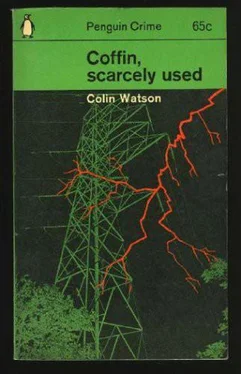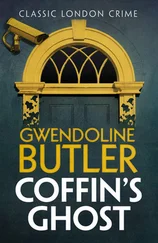“Why not?”
“Because it is one of those simple and rather pathetic circumstances that a murderer prefers to forget when thinking about his victim. He or his accomplice—and Gloss must have been one or the other if Gwill met his end this side of the front door—would only mention the sweet-eating if it were an essential part of his alibi or self-justification. And we haven’t the slightest reason to suppose that it was either.”
Purbright patted Love’s shoulder. “Cheer up,” he said. “What do you say we go next door and bully the poor widow-woman for a while?”
The widow-woman they found tweedy, business-like and very self-possessed. She seemed, moreover, pleased to see them—a bad sign in a witness, as Purbright knew; for policemen, like illnesses, are best held at bay by determined cheerfulness.
“How nice of you to come round,” she said. “Yes, I know you promised, but promises are made so often in an attempt to be kind on the spur of the moment and broken afterwards when sympathy has had time to cool off.”
She led them into the large room facing Heston Lane. It was, tastefully and expensively furnished and was far more attractive than its gloomy counterpart at The Aspens.
“Do sit down,” said Mrs Carobleat. “I’ve had not a soul to talk to since the man came to read the meter last week, and his conversation was limited, to put it mildly. He has to save his breath to stoop into all those little cupboards, I suppose.” She offered cigarettes and lit one herself with a large table lighter. “You’ll have some tea, won’t you?”
Not waiting for a reply, she darted to the door and disappeared. They heard her giving brief instructions at the rear of the house. Then, almost immediately, she was back again. Whatever her age, Purbright reflected, she had a fitful energy and suppleness that betokened a woman with plenty of money and no lack of ideas of what to do with it. He realized that the Joan Carobleat he had seen on two previous occasions had been an understatement of her proper self. Six months ago, it was a newly bereaved wife with whom he had dealt. Then, this past Tuesday in the teashop, it was...well, what? A newly bereaved mistress? Or just a woman wearied by a long rail journey? In any case, here she was now, impressively alert and sure of herself.
“It’s only fair,” he told her,” that you should know straight away that this is not a social call.”
She widened her eyes but continued to smile. “Oh, come, inspector; all calls are social if those who make them have the grace to keep their real purpose to themselves until the kettle boils.”
Purbright decided to qualify for the compliment. He and his hostess shuttled small-talk for a while, watched politely by Love in the manner of a tennis spectator. Soon tea was brought on a large lacquered tray by a deferential, tight-lipped woman whom the policemen assumed to be a maid. They looked at her surreptitiously and with curiosity, for servants were not common in Flaxborough households. It was a bit like the pictures, Love told himself, adding the sour qualification that in real life the circumstance suggested ill-gotten gains.
Perhaps Purbright thought the same. He said: “You seem to be managing fairly smoothly, Mrs Carobleat. On your own, that is. I admire you for it.”
“That is gallant of you, inspector. But you should reserve your admiration for my late husband’s insurance company. I take no credit.”
“Financial independence doesn’t always make widowhood easier to bear.”
“Doesn’t it?” She explored a plate of biscuits and picked out a chocolate one.
“I should have thought the lack of companionship was the hardest part.”
“You are being very Godfrey Winney today, inspector. What are you after? A confession of my awful goings on with the gentleman next door?”
“I wouldn’t dream of being so impertinent as to ask any such thing,” said Purbright. He turned to Love. “You ask the lady, sergeant.”
Love’s mouth fell open. Then he swallowed and grinned doubtfully. He was rescued by Joan Carobleat. She laughed and said: “Never you mind, sergeant—Mr Purbright is just pulling our legs. Now, then”—she faced Purbright again—“what is it you are really after?”
“The murderer of the gentleman next door.”
“Yes, I suppose you are...” Her voice was suddenly grave. After a long pause she began stirring her tea. As she watched a floating leaf whirl round the rim, she said: “You know I can’t help don’t you? I know nothing that could have the slightest bearing. I wasn’t even here.” She tried to capture the leaf on the tip of her spoon, but it went by, revolved once more, and sank.
“You saw a good deal of Gwill, didn’t you?” Purbright asked.
“I seem to remember your putting that question before—in the teashop, wasn’t it?”
“You said then that you had merely called occasionally as a neighbour. To cheer him up, or something.”
“That still expresses it adequately.”
“You were being facetious just now about some ‘awful goings on’.”
“I can be as facetious as I like about matters of which you are now unlikely ever to be the wiser.”
“Mrs Poole might have given me a fairly clear idea of your relationship.”
Mrs Carobleat smiled. “A half-witted old servant?”
“You don’t wish to confide in me any further, then? I assure you I am the soul of tact and broad-mindedness. Come, now—you and Gwill were more than pally neighbours, weren’t you, Mrs Carobleat?”
She frowned, but not with annoyance. “Look here, inspector: suppose just for the hell of it I admitted what Mrs Poole would call The Worst...just what would be its bearing on your inquiries?”
“I might be a little nearer to discovering a motive for what seems at the moment a singularly pointless crime.”
“Come, widows don’t provide motives—except sometimes for other men’s wives.”
“They occasionally have motives of their own. I don’t suppose they are proof against being discarded, scorned, dishonoured—all that sort of thing, you know.”
She broke into a little clatter of laughter. Purbright, too, was smiling. But his eyes were alert.
“And how do you suggest this poor widow avenged her dishonour, inspector? When she wasn’t even in the same town at the time?”
“You were in Hereford, you said?”
“Shropshire. The Lad’s county, you know.”
“Ah, yes. You spent Monday night in a pub with a peculiar name. The Brink of Discovery.”
“I fancy its proprietor would prefer you to call it an inn. But at least you have the name right.”
“Was anyone else staying in this house while you were away? Your...the young woman who brought the tea?”
“Anna? Oh, no. She goes to some friends on a farm when I take a holiday. You were going to call her a maid, weren’t you? She isn’t quite that, actually. You could say companion if that doesn’t make me sound terribly Bayswater. And old,” she added.
“You had no idea of what had happened here until you returned from Shropshire and heard of Mr Gwill’s death from me?”
“None whatever. It was hardly likely that the news would have reached me the same morning, even if anyone had thought I would wish to be told.”
“Hardly.” Purbright considered a moment. “Did Mr Gwill have any...any presentiment of harm coming his way? Did he mention to you the possibility of his having an enemy?”
She pouted and shook her head.
“How did he get on with the men I presume to have been his friends—those who visited him regularly? Mr Gloss, for instance?”
“Gloss was his solicitor. He had quite a high opinion of him, I believe.”
“Dr Hillyard?”
“I really couldn’t say.”
Читать дальше












